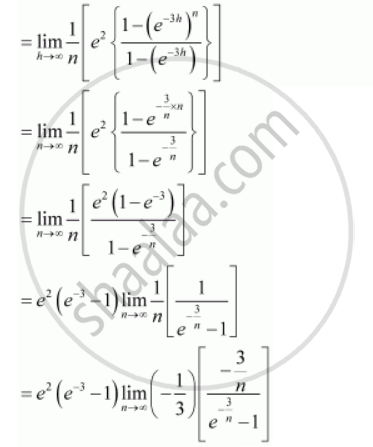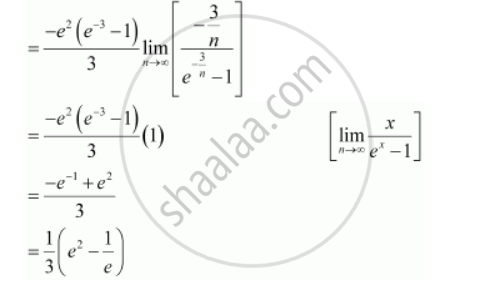Advertisements
Advertisements
प्रश्न
Evaluate `int_0^1 e^(2-3x) dx` as a limit of a sum.
उत्तर



APPEARS IN
संबंधित प्रश्न
Evaluate `int_(-1)^2(e^3x+7x-5)dx` as a limit of sums
Evaluate `int_1^3(e^(2-3x)+x^2+1)dx` as a limit of sum.
Evaluate the following definite integrals as limit of sums.
`int_2^3 x^2 dx`
Evaluate the following definite integrals as limit of sums.
`int_1^4 (x^2 - x) dx`
Evaluate the following definite integrals as limit of sums `int_(-1)^1 e^x dx`
Evaluate the following definite integrals as limit of sums.
`int_0^4 (x + e^(2x)) dx`
Evaluate the definite integral:
`int_0^(pi/4) (sinx cos x)/(cos^4 x + sin^4 x)`dx
Evaluate the definite integral:
`int_(pi/6)^(pi/3) (sin x + cosx)/sqrt(sin 2x) dx`
Evaluate the definite integral:
`int_0^1 dx/(sqrt(1+x) - sqrtx)`
Prove the following:
`int_1^3 dx/(x^2(x +1)) = 2/3 + log 2/3`
Prove the following:
`int_0^1 xe^x dx = 1`
Prove the following:
`int_0^1sin^(-1) xdx = pi/2 - 1`
`int dx/(e^x + e^(-x))` is equal to ______.
`int (cos 2x)/(sin x + cos x)^2dx` is equal to ______.
Evaluate the following integrals as limit of sums:
\[\int\frac{\sqrt{\tan x}}{\sin x \cos x} dx\]
Evaluate `int_1^4 ( 1+ x +e^(2x)) dx` as limit of sums.
Solve: (x2 – yx2) dy + (y2 + xy2) dx = 0
Evaluate `int_(-1)^2 (7x - 5)"d"x` as a limit of sums
Evaluate the following as limit of sum:
`int _0^2 (x^2 + 3) "d"x`
Evaluate the following as limit of sum:
`int_0^2 "e"^x "d"x`
Evaluate the following:
`int_0^(pi/2) (tan x)/(1 + "m"^2 tan^2x) "d"x`
Evaluate the following:
`int_0^pi x sin x cos^2x "d"x`
Evaluate the following:
`int_0^(1/2) ("d"x)/((1 + x^2)sqrt(1 - x^2))` (Hint: Let x = sin θ)
The value of `int_(-pi)^pi sin^3x cos^2x "d"x` is ______.
Left `f(x) = {{:(1",", "if x is rational number"),(0",", "if x is irrational number"):}`. The value `fof (sqrt(3))` is
The limit of the function defined by `f(x) = {{:(|x|/x",", if x ≠ 0),(0",", "otherwisw"):}`
